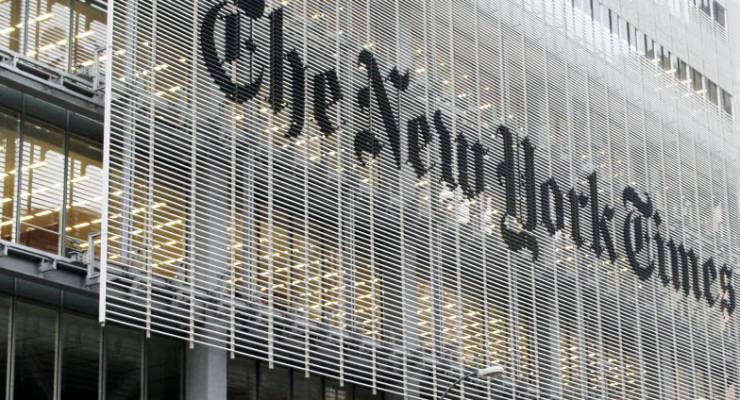
With the victory of Joe Biden and the departure of Donald Trump, the US left appears to have lost its brief moment of unity and returned to its cultural civil war about the nature of language, free speech and the boundaries of acceptable opinion.
It has a generational aspect, but that could be overstated. It is often a raw power struggle, but that too is disguised. And without The Donald raging in The White House as a unifying opponent, it seems set to open up wide again.
The most recent manifestation has been at The New York Times, which has seen a number of sackings for cultural offence, but which has blown up with the resignation of science writer Donald McNeil Jr, who issued a grovelling apology regarding an event two years ago.
McNeil was leading a (rather pricey) student tour of Peru sponsored by the NYT and was, at dinner, discussing the use of what we now call “the n-word” in articles. In doing so he apparently used the word (which I’ll refer to, in US fashion as “n-” from hereon) quotationally.
Subsequently 150 employees of the NYT signed a letter demanding an apology. And he duly went, with a letter that had a light touch of Stalin’s show trials about it.
The issue is murky to say the least. There have been accusations that McNeil had used such words in a non-quotational form at other times, but they formed no part of the case against him. Adjudicating it from the outside is pointless, though it is almost impossible for those of us from a political background which emphasises the importance of free speech to not see it as a massive overreaction.
What is significant is that this, and a half-dozen other such causes, have kicked into life after Trump’s departure.
A sort of truce that was in place to focus on the common enemy has now come down, and the war around language and meaning is on again. That war is no trifle. It is occurring within the left/progressive side of things, largely within the knowledge class section of it, because of the “language effect”.
If you work in language, images and symbols all day, and if such have increasing social power — if they run systems and create selfhoods — then the question of the language effect becomes real. Words do then have a material effect on persons; saying “n-” can be, in some situations, more like hitting someone with a bat than engaging in robust discussion.
One side of the progressive left — those in “knowledge” professions on the road to class power — see that material conception of language as absolute. They have no qualms about leveraging state or corporate power to shape behaviour.
For those of us from a left focused on trying to gain political-economic power for the most powerless, the emphasis on language as free speech exchange has to be uppermost. Not because of any classical liberal style fetishisation of it, but because it is essential to making visible power that exists. Some on the left foolishly went way too far co-operating with “no platforming” demands against far-right groups.
The blanket shutdown of those in the wake of the January 6 US Capitol invasion has swept up hundreds of left groups, websites, Facebook pages, etc — including those which explicitly renounce putschist action while affirming the democratic right to revolt.
The conflict between these two broad formations has the status of a war because many in the progressive-knowledge groups no longer see themselves in alliance with a left, or with the poor and economically powerless.
Gender and race have become the all-but exclusive lines of division. It’s a move which allows the women and POC sections of the knowledge class to claim to represent the interests of all women and POC; they claim to have no conflicts of interest between each group and to share, uniformly, the degree of oppression of the most oppressed within such major formations.
At its worst this is a form of “oppression-cooption”, in which the symbolic and moral capital of oppression is alienated from the actually oppressed by said sections of the rising knowledge class.
This is presented as solidarity, but it’s really a version of what the Italian sociologist Vilfredo Pareto called “the circulation of elites”: the replacement of one clique by another, the latter marshalling a new morality to legitimise their takeover (a morality which might well have real claims of justice).
What was once a strategic debate between sections of the left is now a political/class conflict. There are those who still see themselves as fighting for the oppressed with a premium on defending the sphere of free speech, and those who have now quit that fight entirely and are fighting for their sectional elite interests — often disguised as a more general struggle.
Joe Biden’s accession was a victory for the broadest coalition of those groups. Now that it has been won, you can expect the cultural political war — around language, the state, censorship and, yep, freedom — to become the main game.








Crikey is committed to hosting lively discussions. Help us keep the conversation useful, interesting and welcoming. We aim to publish comments quickly in the interest of promoting robust conversation, but we’re a small team and we deploy filters to protect against legal risk. Occasionally your comment may be held up while we review, but we’re working as fast as we can to keep the conversation rolling.
The Crikey comment section is members-only content. Please subscribe to leave a comment.
The Crikey comment section is members-only content. Please login to leave a comment.